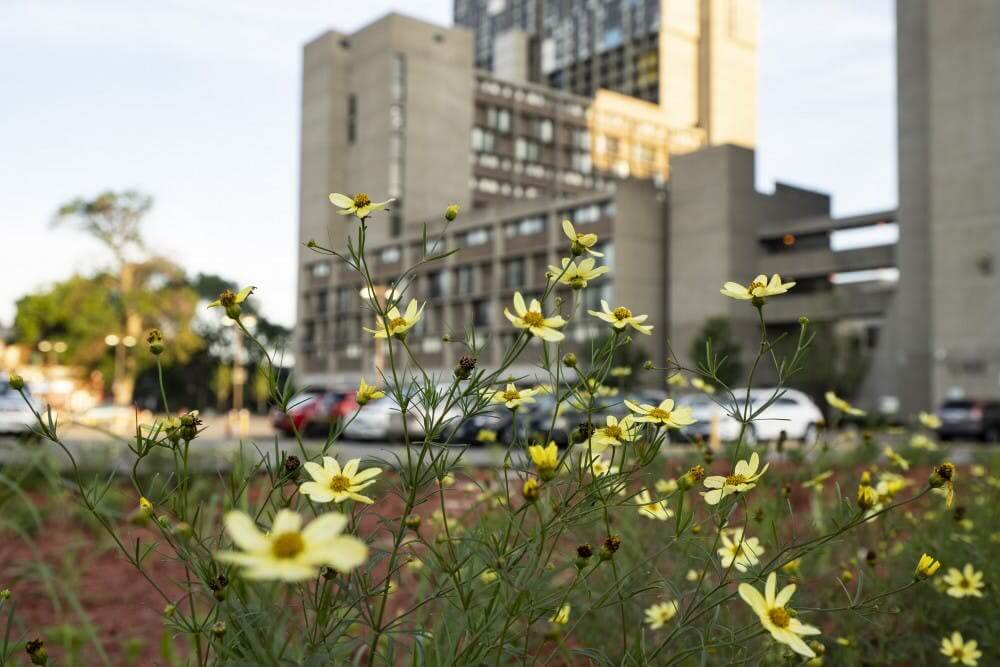
07.04.19
Urban ecosystems grow in Cedar-Riverside
Rain gardens help to sustain pollinators while filtering clean water.
By CAITLIN ANDERSON
A rain and pollinator garden in the Riverside Plaza area as seen on Sunday, June 30 2019.
A new urban rain garden project in Cedar-Riverside does more than attract pollinators. It reflects a metro-wide push for developers to implement similar environmental strategies around the city.
The rain garden at the Riverside Plaza apartments features plants that are friendly to insect pollinators, like bees. The first garden, part of a partnership between the building’s developer, Sherman Associates and nonprofit Metro Blooms, was installed on June 18. A second garden will be finished later this summer.
“A lot of our work is focused on how do we get more pollinator habitats in an urban setting,” said Laura Scholl, associate director of Metro Blooms, which encourages sustainable landscaping. “So, one way that we can do that is by installing rain gardens.”
Rain gardens, landscaped areas designed to catch stormwater for ground absorption, prevent polluted water from seeping into larger bodies, like rivers. These gardens are often filled with native plants, which are usually also pollinator-friendly.
Environmental groups have increasingly encouraged developers to use these plants and stormwater strategies to promote healthy urban ecosystems.
“So, it’s sort of three aspects: one, is it good for the water, is it good for a wide variety of pollinators and then is it native?” said Cordelia Pierson, commissioner and vice chair for the Mississippi River Parkway Commission, which aims to preserve the scenic byway along the river.
The rain garden at Riverside Plaza incorporates pollinator-friendly plants like blue false indigo and catmint. Developers can use these plants instead of turf grass, which has nearly no pollinator benefits.
The Mississippi Watershed Management Organization also works to improve urban water quality and habitats in areas where stormwater empties into the Mississippi River.
MWMO worked with private developers like Aeon, The Cornerstone Group, Harlem Irving Companies and Prospect Park Properties in 2016 to construct the Towerside District Stormwater System, which holds stormwater underground for reuse near the University of Minnesota campus. The organization provided $1.3 million in funding for the project.
“I think we proved that it's doable,” said Stephanie Johnson, projects and outreach director for MWMO. “And at the end of the day, we've got a project that we're all really proud of, and excited about.”
No city ordinances currently require developers to use pollinator-friendly plants or natural stormwater management strategies, Johnson said. In response, Pierson spoke to the City of Minneapolis Planning Commission in June, requesting the city require an ongoing development in Marcy-Holmes to include this infrastructure.
The development, located at the former General Mills site, is led by Doran Companies and CSM Corporation.
A letter to the Marcy-Holmes Neighborhood Association dated April 15 sent by Cody Dietrich, senior development associate for Doran Companies, did not lay out plans to incorporate pollinator-friendly plants. Doran Companies was unavailable for comment.
Dan Shaw, senior ecologist for the Minnesota Board of Water and Soil Resources, said maintenance concerns are an obstacle to implement pollinator-friendly plants. But with proper maintenance, native plants can be cost-effective in the long-run, he said.
“We've been seeing significant decline of wildlife, in general, the pollinators species,” he said. “We need to be finding ways to benefit all these pollinator species in our landscape.”
Full Article
By CAITLIN ANDERSON
A rain and pollinator garden in the Riverside Plaza area as seen on Sunday, June 30 2019.
A new urban rain garden project in Cedar-Riverside does more than attract pollinators. It reflects a metro-wide push for developers to implement similar environmental strategies around the city.
The rain garden at the Riverside Plaza apartments features plants that are friendly to insect pollinators, like bees. The first garden, part of a partnership between the building’s developer, Sherman Associates and nonprofit Metro Blooms, was installed on June 18. A second garden will be finished later this summer.
“A lot of our work is focused on how do we get more pollinator habitats in an urban setting,” said Laura Scholl, associate director of Metro Blooms, which encourages sustainable landscaping. “So, one way that we can do that is by installing rain gardens.”
Rain gardens, landscaped areas designed to catch stormwater for ground absorption, prevent polluted water from seeping into larger bodies, like rivers. These gardens are often filled with native plants, which are usually also pollinator-friendly.
Environmental groups have increasingly encouraged developers to use these plants and stormwater strategies to promote healthy urban ecosystems.
“So, it’s sort of three aspects: one, is it good for the water, is it good for a wide variety of pollinators and then is it native?” said Cordelia Pierson, commissioner and vice chair for the Mississippi River Parkway Commission, which aims to preserve the scenic byway along the river.
The rain garden at Riverside Plaza incorporates pollinator-friendly plants like blue false indigo and catmint. Developers can use these plants instead of turf grass, which has nearly no pollinator benefits.
The Mississippi Watershed Management Organization also works to improve urban water quality and habitats in areas where stormwater empties into the Mississippi River.
MWMO worked with private developers like Aeon, The Cornerstone Group, Harlem Irving Companies and Prospect Park Properties in 2016 to construct the Towerside District Stormwater System, which holds stormwater underground for reuse near the University of Minnesota campus. The organization provided $1.3 million in funding for the project.
“I think we proved that it's doable,” said Stephanie Johnson, projects and outreach director for MWMO. “And at the end of the day, we've got a project that we're all really proud of, and excited about.”
No city ordinances currently require developers to use pollinator-friendly plants or natural stormwater management strategies, Johnson said. In response, Pierson spoke to the City of Minneapolis Planning Commission in June, requesting the city require an ongoing development in Marcy-Holmes to include this infrastructure.
The development, located at the former General Mills site, is led by Doran Companies and CSM Corporation.
A letter to the Marcy-Holmes Neighborhood Association dated April 15 sent by Cody Dietrich, senior development associate for Doran Companies, did not lay out plans to incorporate pollinator-friendly plants. Doran Companies was unavailable for comment.
Dan Shaw, senior ecologist for the Minnesota Board of Water and Soil Resources, said maintenance concerns are an obstacle to implement pollinator-friendly plants. But with proper maintenance, native plants can be cost-effective in the long-run, he said.
“We've been seeing significant decline of wildlife, in general, the pollinators species,” he said. “We need to be finding ways to benefit all these pollinator species in our landscape.”
Full Article

04.24.24
Sherman Associates scores 3 Real Estate Awards from the Minnesota Real Estate Journal
Sherman Associates brought [...]
Read More

04.12.24
Hello Iowa: Start Fresh with Clean Slate at Community for Active Adults
Featuring Allison Shaw, Regional Director of Operations [...]
Read More

03.25.24
La Madre to bring Mexican cuisine to the Mill District
The restaurant with patio will be located at Sherman Associates [...]
Read More
